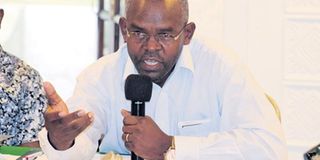Treasury secretary grilled for 4 hours over audit queries

Treasury Principal Secretary Kamau Thugge responds to questions from the Public Accounts Committee during a three-day retreat at Serena Beach Hotel in Mombasa. The committee sought answers to queries raised in the Auditor General’s report. PHOTO | WACHIRA MWANGI | NATION MEDIA GROUP
What you need to know:
- PS asked how the national government would fail to account for Sh67 billion.
Treasury Permanent Secretary Kamau Thugge was grilled for more than four hours by the Public Accounts Committee (PAC) of the National Assembly over the unaccounted for Sh67 billion queried in the auditor-general’s latest report.
Committee chairman Nicholas Gumbo, Mbalambala MP Abdikadir Omar and Kibwezi East MP Jessica Mbalu did most of the questioning, and asked the PS how the national government would fail to account for such a huge amount.
The MPs also asked why the Controller of Budget did not deposit about US $2 billion — proceeds from the Sovereign Bond — in the Consolidated Fund Account as required by law, instead depositing the money in “an offshore account”.
The PAC members also observed many “grave” financial irregularities, including the expenditure of huge sums of public funds by line ministries without parliamentary approval as stipulated by the Constitution and financial regulations.
“From the auditor-general’s report, for example, the Ministry of Health spent Sh24.5 billion in the 2013/2014 financial year without parliamentary approval?” asked Mr Gumbo.
Ms Mbalu asked why several millions had been spent without supportive documents or evidence of transaction.
“Mr PS, can you comment on why millions of shillings were spent without any evidence of a transaction? There is no supporting local purchase order, no invoice, and no deliveries. Millions more were withdrawn without the authority of the Exchequer; why?” she asked.
DISCREPANCIES
Mr Thugge admitted that the threshold of “supported accounts” is documents for every transaction and that there were discrepancies in revenue and expenditures in certain ministries.
“I also find it very hard to believe that the Ministry of Health can spend Sh24 billion without Parliament’s approval,” he said.
He added: “But what I know is that, at one time there was a crisis after the ministry was devolved. Counties had a difficult time paying doctors and health workers’ salaries for six months. The national and county governments, together with the Controller of Budget, agreed on these funds.”
Mr Thugge insisted that in all the expenditures and revenue, his ministry followed expert advice from accountants and that no money had been lost, only that the documentation was the problem.
“We have had meetings and I have even written to the Controller of Budget to furnish evidence and explanation on the matters you have raised. We are still waiting for the reports from accountants from line ministries and we shall have another engagement with you so that we can deliberate further on the report,” said the PS.
The PS noted, however, that accountants from various ministries had presented their recommendations to the office of the attorney-general on how to curb the irregularities, but were ignored.
He said the controversies cited in the auditor-general’s report emanated from four main areas that include unexplained expenditures, unbalanced figures, funds carried forward from 2012/2013 financial year, and the foreign bond.
Mr Thugge told the committee that the sovereign bond — where the country borrows money from external sources — was a new phenomenon and the country was just learning how to manage such funds. This could have led to the discrepancies, he said. He denied assertions by the MPs that the sovereign bond borrowing was made to finance the Sh327 billion standard gauge railway.
“There was no relationship between the sovereign bond borrowing and the railway. The railway had its own separate funding and was not even factored in our budget estimates,” he said.
The $2 billion sovereign bond loan will mature in 2018 and 2024, he said, with $500 million to be paid within the first five years at an interest rate of 5 per cent.
The last tranche, $1.5 billion, will be paid in the next 10 years, he said.




